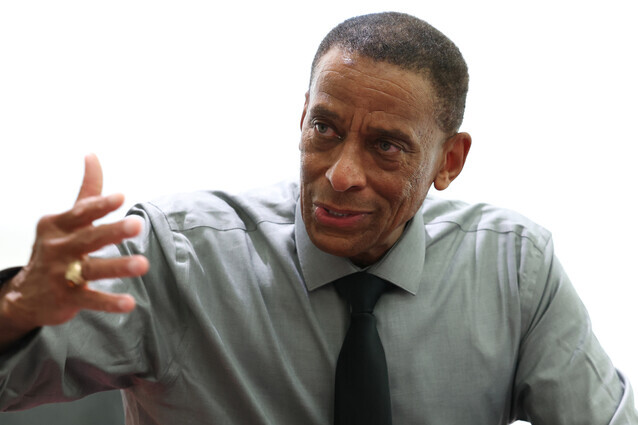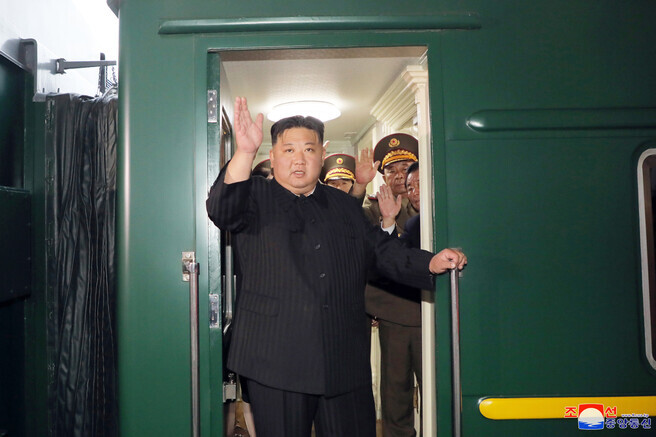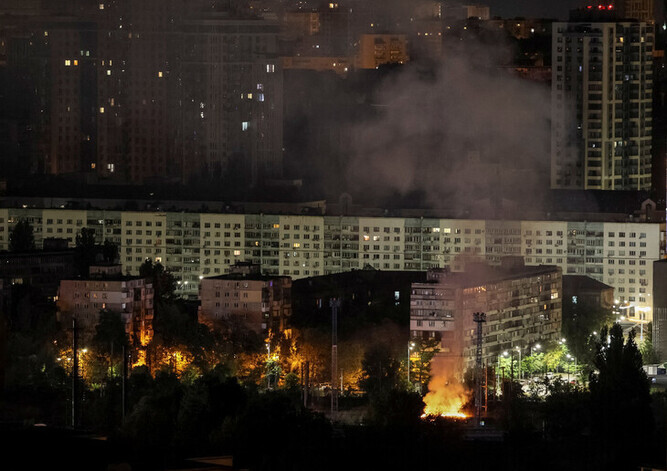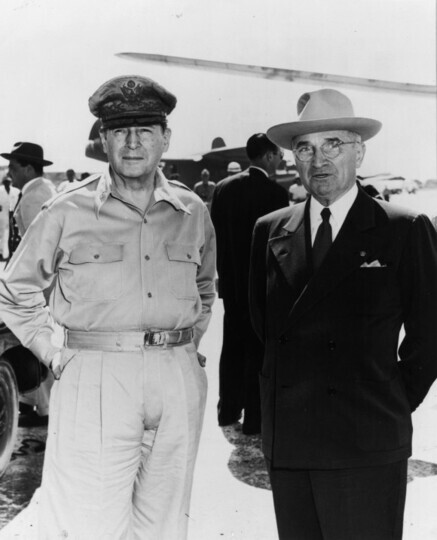hankyoreh
Links to other country sites 다른 나라 사이트 링크
[Interview] “It’s a miracle that nuclear weapons weren’t used in the Korean War”

Adrian Lewis, 70, is a professor of history at the University of Kansas and an eminent thinker on military strategy.
As a scholar of warfare, he published the book “The American Culture of War” (2017), in which he provided an in-depth exploration of the reasons that the US — despite its overwhelming firepower — has come out on the losing side of nearly all its conflicts since World War II, including wars in Vietnam, Afghanistan and Iraq.
Meeting with Lewis while he was visiting to attend an international peace conference in Incheon, the Hankyoreh asked him to comment on the recent “new Cold War” situation, the war in Ukraine, strategies for the Korean Peninsula, and the possibility of nuclear weapons actually being used.
He predicted that the war between Russia and Ukraine would drag on into the long term — and that the new Cold War framework pitting South Korea, the US, and Japan on one side against North Korea, China, and Russia on the other will remain in place for the foreseeable future.
In terms of the South Korean government, he observed that while the alliance with the US is important, Seoul is not in a position to fully entrust its security to the US when the political situation there could change at any time. Instead, he urged it to make “balanced decisions” based on its geopolitical position and to always have a contingency plan in place.
A field-grade officer in the past, Lewis worked as a professor at the United States Military Academy. During the 1970s, he was stationed in Korea. His wife and daughter have both worked in South Korea in military positions.
Lewis said all the members of his family have “always had a lot of interest” in the situation in South Korea. Our interview took place on Sept. 8 at the Songdo Convensia convention center in Incheon.
Hankyoreh: Let’s start with the current issues. North Korean leader Kim Jong-un is meeting with Russian President Vladimir Putin. They are to discuss weapon transactions, and some are even mentioning the possibility of an expansion of satellite and nuclear missile cooperation. What impact do you foresee this having on North Korea-Russia relations and the Korean Peninsula?Lewis: North Korea and Russia have often used the same kinds of things, including ammunition and weapon types and systems. They need each other: Russia needs North Korea so that it can continue its war with Ukraine, and North Korea needs Russia for its national security. Chinese President Xi Jinping is also fundamentally going to support greater closeness between North Korea and Russia [even if China does not itself pursue a trilateral military partnership with them].
Hankyoreh: North Korea has also claimed to have built a tactical nuclear attack submarine. This would be intended for submarine-launched ballistic missiles. What do you see as the significance of this?Lewis: North Korea already possesses nuclear capabilities. We can criticize it for possessing nuclear weapons, but from North Korea’s standpoint, it would have to be crazy to choose to denuclearize and give up those weapons.
In addition to its nuclear weapons, North Korea also has a delivery system [intercontinental ballistic missiles], which means it is already capable of nuclear strikes against San Francisco or New York. It has two means of carrying out a nuclear strike: ICBMs and SLBMs. That means that it has those two nuclear capabilities, even if we may not think much yet of its tactical nuclear attack submarine performance.
I expect North Korea will have completed the nuclear weapons it needs to strike the continental US within the next six months to a year.

Lewis: In the past, Xi Jinping has called for North Korea’s denuclearization, but I expect he will now support North Korea’s acquisition of nuclear capabilities [due to the intensifying antagonism between the two blocs].
The arms race by the major powers, including the US, China and Russia, has been proceeding at a very fast rate. The US has Columbia-class submarines and B-21 stealth bombers, while Russia has hypersonic missiles capable of carrying nuclear weapons. This is a very dangerous situation for the world.
South Korea is surrounded on all sides by these multipolar powers. The US may pressure it to take sides, but it doesn’t have to follow the US blindly.
The thing to remember is that South Korea is a sovereign country. It needs to adopt a balanced position. I know that’s not an easy decision to make, given South Korea’s geopolitical situation.
Hankyoreh: Whether conservative or progressive, there haven’t been any administrations in South Korea that have disregarded the importance of the alliance with the US. The only difference has been how concerned they’ve been about relations with China. The Yoon Suk-yeol administration’s position has been in favor of national security guarantees through the South Korea-US alliance, while also using a stronger alliance with the US to resolve issues in its relationship with Beijing. What is your take on that?
Lewis: I listened to President Yoon’s speech before the US Congress. As you could see from the Washington Declaration last April, the Yoon Suk-yeol administration seems to be looking to depend on the South Korea-US alliance for a lot of things in terms of its national security.
But relying entirely on an ally for security has not been the strategic approach to foreign affairs and national security that we’ve recently seen from the countries of the world. In Afghanistan, the US made a pledge to protect it and then withdrew later on when the situation turned against it. We can’t entirely rule out the possibility of a future situation like a withdrawal of US troops.
The South Korea-US alliance is not a panacea. Donald Trump could end up being re-elected in next year’s US presidential election. That could create unpredictability, where we don’t know what sorts of things will happen.
It is neither appropriate nor possible for South Korea to rely on the US for everything in terms of national security without independent input. They shouldn’t put their trust fully in the US. That could be a grave mistake.
The relationship with the US is important, but other doors need to always be left open. The 1950s was the last time we saw an era where superpowers were security proxies for individual countries. A country can’t entrust its security to another country.
Hankyoreh: When and how do you foresee the war in Ukraine ending? When it first erupted, many predicted Russia would win easily.Lewis: The first thing I would note is that Russia has not been “defeated” in Ukraine in any sense. Last July, US Secretary of State Antony Blinken said that 50% of the territory captured since the Russian invasion had been reclaimed. That means the remaining 50% hasn’t been recovered yet.
There have been tens of thousands of civilian deaths, but I don’t expect Putin to end this war any time soon.
We’ll likely see a shift to an offensive from Russia. There’s a strong chance Ukraine will lose more territory.
Putin can’t afford to give up on Ukraine. Imagine what the US would do if China were to enter a military alliance with Mexico. Neither the American government nor the American public would accept that. Ukraine’s attempt to join NATO was inevitably going to be a major threat to Russia.
Hankyoreh: In the initial phase of the war, there were some who blamed Ukraine for trying to join NATO and said the Ukrainians should have been more prudent. But given the terrible human toll that Ukraine has suffered since then, that perspective seems to have shifted to holding Russia responsible, on humanitarian grounds, for starting the war.Lewis: It was wrong for Russia to invade Ukraine. But I think the primary origin of the war was Ukraine’s attempt to join NATO. After the fall of the Berlin Wall in November 1989, the US asked the Soviet Union in February 1990 to help with Germany’s reunification while promising not to extend NATO eastward. But NATO has been gradually creeping closer to Russia, with the admission of the three Baltic states in 2004. Russia would obviously be disturbed by the idea of Ukraine joining NATO. We need to be more judicious in how we view the US media coverage of Ukraine. The American media tends to present Putin as a gangster and the US as a savior of humanity. But that’s not the whole story.

Lewis: I don’t think the war will go the way the US wants it to. Pouring huge amounts of money into Ukraine won’t be able to alter the situation substantially. The war will become protracted, and not even the US is capable of bringing it to a close. The economic sanctions on Russia have failed as well. In fact, they’ve been most painful for Europe, which had been importing natural gas and other raw materials from Russia. On a related note, Germany’s economic growth rate for this year has fallen to 1%. Other unexpected consequences are the BRICS [Brazil, Russia, India, China and South Africa] countries’ push for de-dollarization and Russia’s cozier ties with China. Washington’s economic sanctions against Russia will increasingly become a liability for the US.
Hankyoreh: What stance should the Korean government adopt toward the war in Ukraine? Russia has warned Korea about providing Ukraine with ammunition just as the US has warned North Korea about making an arms deal with Russia.Lewis:Ever since the fruitless end of the 2019 summit in Hanoi, the US has lost all credibility with North Korea. So North Korea is going to [ignore the US’ warnings and] do as it pleases. But South Korea is different from the North. It needs to keep some distance. I think the wise choice would be to avoid giving or selling Ukraine any ammunition or other lethal armaments. I think Korea ought to limit itself to humanitarian aid.
Hankyoreh: How long do you think the current neo-Cold War alignment will last?Lewis:I’m worried that the whole world is bound for war; I’m worried that we’re headed for a dark time. The countries of the world keep increasing their defense budgets as they align themselves exclusively with one side or the other. What’s especially dangerous is how much the great powers — including the US, China and Russia — are focusing on developing nuclear weapons. Even during the Cold War, the US and the Soviet Union had the strategic arms reduction treaties (START), but there are no signs of anything of that sort today. The US keeps raising its defense budget, and China and Russia are following suit.
In 1950, the US National Security Council drafted a policy paper titled NSC-68. The paper argued that the US needed to triple or quadruple its defense spending in order to prevent the Soviet Union from spreading communism around the globe. Since then, the US has become the world’s greatest military power by far. [The US spends far more money each year on defense than the next nine biggest-spending countries combined, including China and Russia.] For the time being, no country will be able to acquire military power rivaling that of the US. China is making an effort, but I doubt the US will just stand by and watch.
The US is a country that wages war. There have only been 16 years in the past 200 when the US hasn’t been fighting a war somewhere. It’s still at war today. It’s the world’s biggest arms manufacturer, and the world’s biggest arms exporter. The US spends at least US$800 billion on its defense budget every year. [US$842 billion has been budgeted for the 2024 fiscal year.] For the US, war is business, too. In light of NSC-68, which remains the foundation of America’s foreign policy and national defense, there’s absolutely no reason to think the world will be at peace in the years to come.

Lewis: That’s the crux of our interview today. The Korean War was a crucial landmark in modern warfare — the first artificial limited war. China’s intervention in the war led to the US military’s biggest retreat in history, and President Harry Truman came under intense pressure to use nuclear weapons. But he decided not to use them. That was the moment when artificial limited war was born.
It wasn’t easy to opt not to use nuclear weapons as one’s army was losing battles and being forced to retreat. As we saw in “Oppenheimer,” Truman decided to use the atomic bomb in World War II, which brought the war to an early end. But he decided not to use the bomb in the Korean War. That’s a decision for which he ought to be respected, but it also spelled the end of his political career.
It’s a miracle that nuclear weapons weren’t used in the Korean War. The refusal to use them in the Korean War set a precedent that the US was able to stick to in the Vietnam War as well. That’s why, in the history of war, the Korean War is more important than the Vietnam War. Following Truman, President Dwight Eisenhower came up with the concept of “massive retaliation” — threatening a major nuclear retaliation against any attack by the Soviet Union — as a core security doctrine for the US. But the principle of not using nuclear weapons has been maintained until today.
Strategic bombers, intercontinental ballistic missiles and submarine-launched ballistic missiles are the three legs of the nuclear triad. Development continues on megaton-level nuclear weapons, which are strong enough to wipe out the planet. That’s why nuclear weapon states have sought to avoid posing an existential threat to each other. While the Cuban missile crisis occurred under the watch of President John F. Kennedy, both sides tried not to be an existential threat. But nowadays, we’re seeing incidents that do feel like existential threats. For example, China regards crises in the Taiwan Strait as an existential threat.
Hankyoreh: What are the chances of nuclear weapons being used in Ukraine?Lewis: As of now, Russia is not losing. However, if it were to reach a point where it thinks that it might lose the war, there is the possibility that it will use tactical [rather than strategic] nuclear weapons.
Since the late 1950s, the warheads on the Minuteman III ICBMs in Nebraska have had Moscow’s name on them. Russia probably has ICBMs with Washington and New York written on their warheads too. The use of strategic nuclear weapons on large cities like this is a lost cause. The possibility of smaller tactical nuclear weapons being used against troops or military areas, however, remains open.
If Russia is driven out of Ukraine, there’s a possibility that it will use tactical nuclear weapons in Ukraine. The problem is that if they’re willing to use a tactical nuclear weapon, there’s a chance they’re willing to take it a step further as well and cross yet another line.
Right now, both Xi and Putin are trying to avoid crossing any such lines. At least, I hope that they are.
By Kwon Tae-ho, editorial writer
Please direct questions or comments to [english@hani.co.kr]

Editorial・opinion
![[Column] Tariffs on China: Trump was dumb, Biden dumber [Column] Tariffs on China: Trump was dumb, Biden dumber](https://flexible.img.hani.co.kr/flexible/normal/500/300/imgdb/original/2024/0520/191716191153918.jpg) [Column] Tariffs on China: Trump was dumb, Biden dumber
[Column] Tariffs on China: Trump was dumb, Biden dumber![[Column] What if Seoul took reunification by force off the table? [Column] What if Seoul took reunification by force off the table?](https://flexible.img.hani.co.kr/flexible/normal/500/300/imgdb/original/2024/0520/3017161928630494.jpg) [Column] What if Seoul took reunification by force off the table?
[Column] What if Seoul took reunification by force off the table?- [Editorial] Intensifying US-China rivalry means Seoul must address uncertainty with Beijing sooner than later
- [Column] When ‘fairness’ means hate and violence
- [Editorial] Yoon must stop abusing authority to shield himself from investigation
- [Column] US troop withdrawal from Korea could be the Acheson Line all over
- [Column] How to win back readers who’ve turned to YouTube for news
- [Column] Welcome to the president’s pity party
- [Editorial] Korea must respond firmly to Japan’s attempt to usurp Line
- [Editorial] Transfers of prosecutors investigating Korea’s first lady send chilling message
Most viewed articles
- 1Xi, Putin ‘oppose acts of military intimidation’ against N. Korea by US in joint statement
- 2Kim Jong-un wanted to meet with residents of shelled Yeonpyeong Island in South, Moon recalls in mem
- 3To weigh costs and benefits, Korea must stop treating US troop presence as a sacred cow
- 4Berlin mayor hints at tearing down ‘comfort women’ memorial in city
- 5[Column] What if Seoul took reunification by force off the table?
- 6[Column] Tariffs on China: Trump was dumb, Biden dumber
- 7For new generation of Chinese artists, discontent is disobedience
- 8[Exclusive] Truth commission to seek additional murder charges for figures behind 1980 Gwangju massa
- 9China, Russia put foot down on US moves in Asia, ratchet up solidarity with N. Korea
- 10Putin’s trip to China comes amid 63% increase in bilateral trade under US-led sanctions